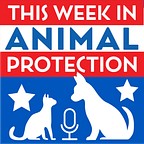
These are some of the stories making headlines in animal protection:
The Houston, TX, City Council voted unanimously to ban the retail sale of commercially-bred animals in pet stores. The ban affects five stores in the city and gives them one year to shift to adoption of animals from shelters or rescue groups. That’s the good news. Unfortunately, the bad news is that the City also reduced “the hold time on strays at [the city shelter] from 72 to 48 hours.” The City says this will “allow for adoptions or transfers for animals” more quickly, but nothing prevents the shelter from killing those animals more quickly, too.
Meanwhile, after several cities and towns passed local bans, Indiana is considering banning the sale of commercially-bred dogs and cats in pet stores statewide.
By contrast, legislation being considered in Florida “would overturn local bans on the sale of [commercially-bred] puppies and kittens” in pet stores. If passed, it would undo progress in reducing the neglect and abuse of dogs and cats in puppy and kitten mills.
And Ed Sayres, the former CEO of the ASPCA, is working to prevent Dallas, TX, from passing a local ban. Sayres, who now works for the commercial-breeding industry, says a ban on the retail sales of milled puppies “accomplishes nothing.” He’s lying. Enacting such a ban serves three purposes: encouraging people to adopt/rescue; educating the community about dog and cat (and rabbit) abuse in mills; and, stopping that abuse. And they work. “Nebraska Department of Agriculture records show that half of the state’s commercial dog and cat breeders have left the business,” thanks to these laws.
The purpose of insurance is to provide peace of mind so that, in the unlikely event that tragedy strikes, one is protected against loss. Dog lovers in Arizona would also have that peace of mind if House Bill 2323, a proposed law prohibiting insurance companies from refusing to insure someone based on the alleged “breed” of their dog, passes the legislature. HB 2323 is based on legislation recently signed into law in both Nevada and New York. These laws save lives, keep families together, and foster fairness.
Out of the shadows and into the sun. Dogs identified as “pit bulls” are welcome again in Harlingen, TX. The City Council overturned the former ban. The City also embraced a community cat program.
The “pit bull” ban in Miami-Dade County will also come to an end if legislation working its way through the Florida state legislature is passed and signed into law. “The Senate Community Affairs Committee unanimously voted for legislation (SB 614) that would prohibit public housing authorities and local ordinances from breed-specific rules on dogs.” SB 614 would also undo “rules targeting pit bulls” in the City of Sunrise.
The City of Los Angeles says it lost its “No Kill” status as the placement rate in 2021 dropped to 85% for cats. While that is tragic as it means more cats and kittens being put to death, truth be told: it was never No Kill. The City and Best Friends Animal Society were lying when they claimed it was.
Wienerschnitzel launched a vegan hotdog nationwide. It comes in three options: “the Backyard Veggie Dog topped with optional dairy cheese, a pickle spear, tomato, ketchup, and mustard; The Barbeque Veggie Dog complete with housemade barbecue sauce, onions, and a pickle; and the classic Chicago Veggie Dog served with tomato, sport peppers, onions, pickles, relish, mustard, and celery salt.” If you hold the cheese on the first, all three are vegan on a vegan bun. After four decades of not being a customer, I am heading back to the chain.
Willow, America’s First Cat, joins the President and First Lady at the White House. She’s the first cat in the White House since India Bush.
Food for thought:










